Women Only. The Turkish Bath Sydney
I, Dave Conroy, The Lone Drainer and Pronto, plumber to the stars of the Eastern suburbs pride myself on running a modern, forward looking business, being proud to be a multicultural Australian and always on the lookout for new ideas, both for plumbing and life.
This week however, by virtue of a visit to the Ottoman Turkish Bath and Day Spa in South Granville, I was privileged to learn something both modern and traditional all at the same time.

And no, it wasn’t the vision of a giant hexagonal white marble bathhouse, with a massive hot spa, surrounded by twenty big white marble wash basins and a huge marble central slab, everything looking like a Renaissance painting, all steam and sexy oriental music. Oh no, it wasn’t even the big marble pedestals where the clients are scrubbed and massaged by dutiful and strong and OK, I’m not shy to say it, attractive female attendants, slathering them in rosewater scented lotions and potions; no, no, no, I didn’t get to see all that, as it’s a women’s only establishment. That was just reported to me by my female colleague who experienced it all. Afterwards she was dopily, dreamily barely able to draw my attention to the DRAINAGE system which was what she thought would interest me.
She was right. Drains are a big deal for plumbers and we get excited when someone does something clever. At the Ottoman Spa, they had managed to combine the most traditional hammam (that’s the Turkish word for bathhouse) architecture with the most modern of drainage systems.
The first hammam was built in 1453 when Sultan Mehmet the Conqueror conquered Istanbul. And its still standing! You can go there if you click here.
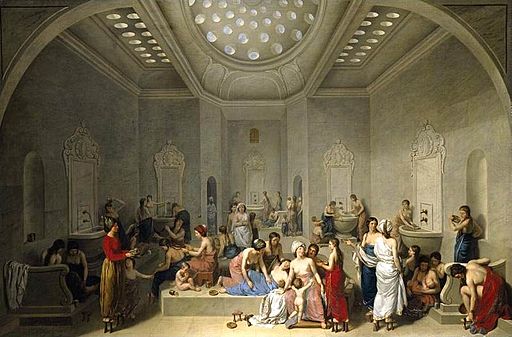
But despite all that classic marble design, the drainage and tiling were super modern and a credit to the tradesmen responsible. It’s not easy to get such vast quantities of water (all that sluicing over all those marble benches) to fall so well and so discreetly over such a vast area.
We’ve come a long way since 1453. And since the invention of the first hollow-pipe drainage by Sir Hugh Dalrymple who died some three hundred years later and yet still gets credited with inventing drainage. Sorry Sultan Mehmet!
That innovation, the new ideas building on the foundation of great old ideas is what I love about plumbing. I got to learn all about hammams today. It’s a great gig.
Dave Conroy. The Lone Drainer.
Thank you Glenys I Love Plumbing.
The Lone Drainer and Pronto. The Gondolier and the Oar maker
I woke this morning May 29th 2023 to read the Sydney Morning Herald story from Venice about the Grand Canal turning a distinctive green. A colour familiar to me.
It looks like the fluorosceine dye we emergency plumbers use to identify the source of water and sewage leaks. It’s often been used by school kids young and old for end of year pranks to turn a fountain green. I believe it is harmless to small aquatic organisms.
I immediately sent a text message to Gio my Venetian gondolier mate to say G’day. It’s a few years ago now that we had Gio guide us around his home town of Venice. Aaah. Travel and plumbing! Spend six minutes with Gio as he shows me around the workshop of Paolo Brandolisio his oarmaker.
On June 1st 2023 a similiar green dye appeared in Melbourne’s Yarra river.
Follow this link to see the story on Australian ABC.
Click here to see other blog posts about Venice courtesy of Gio
Do tree roots grow in sewer pipes during winter?
As we transition into another Sydney winter, my thirst for knowledge about trees and their roots and how and why they grow in sewer pipes and whether they are as active as during the warmer months led me to here.
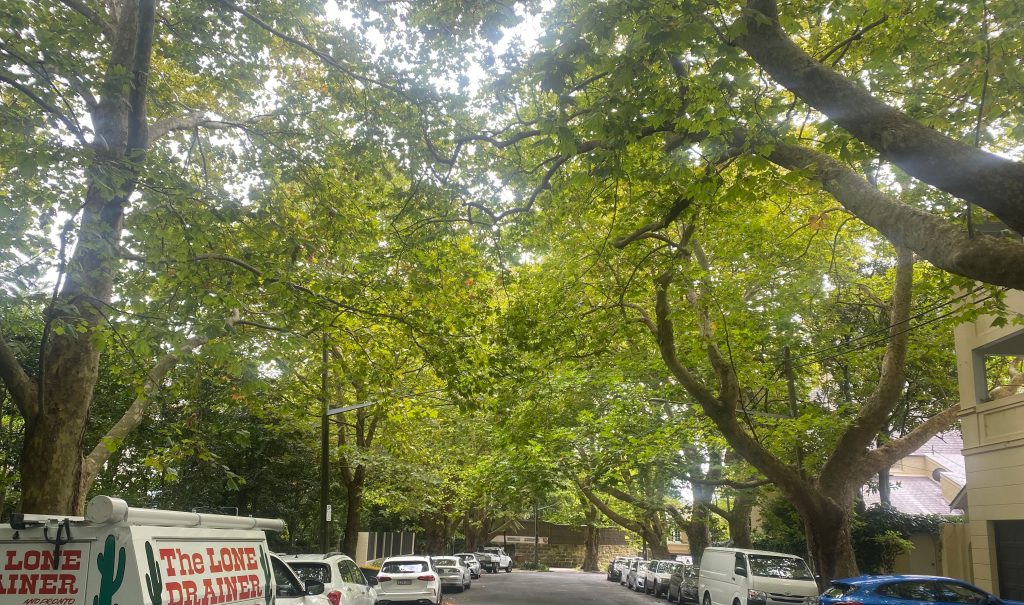
This magnificent display of London Plane trees in Woollahra was just starting to move into autumn mode and we were called to a blocked drain in the street. The blocked drain was caused by tree roots.
Tree roots generally grow more slowly or become dormant during the winter months. The growth of tree roots in drains is influenced by several factors, including temperature, soil conditions, and moisture availability. In colder climates, where winters are harsh and the ground freezes, root growth is typically limited or even halted.
During winter, the soil temperature drops, making it less favorable for root growth. Additionally, the availability of water is often reduced due to freezing or low precipitation levels. These conditions make it difficult for roots to actively grow and expand. Our seasons are changing but traditionally winter in Sydney is our dry season.
However, it’s important to note that tree roots can still function and absorb some nutrients from sewer pipes and drains during winter and continue to cause blockages albeit at a slower rate. They continue to provide support and anchorage for the tree, even if growth is minimal. I believe they are preparing for the spring while they’re hibernating.
And that’s why we still have to attend to tree root drain blockages during winter.
Root growth typically resumes in the spring when temperatures rise, and the soil becomes more conducive to growth. As the weather warms and soil conditions improve, tree roots become more active, allowing for increased growth and development.
Now if you live north of the NSW and Queensland border this theory would probably be tested because it doesn’t cool down as much as the southern states.
If you live in Australia’s sunny north and have a tale to tell about your blocked drains and tree roots, you can tell it here.
Full Flush or Half. Which is used more?
It depends! On the context and the specific type of toilet. But think about your own use.
Remembering, not everyone on the planet has a flushing toilet and unbelievably, a full toilet flush is more water than most people in the world use every day.

In some places, toilets have a dual flush option, where the user can choose between a half flush and a full flush, depending on the waste being disposed of. The dual flush toilet cistern was invented by an Aussie, Bruce Thompson at Caroma industries in 1980 as a water saving function for the dry continent
Generally, the half flush is used more frequently than the full flush, as it is typically used for liquid waste and the full flush is used for solid waste. However, it can be varied by country, region or building regulations, as some places may require the use of a half flush for all waste to conserve water.
So I say, its the half flush that gets used the most. What do you think?
Flush the toilet and wash your hands.
The toilet flush button can potentially be a source of germs and bacteria, as it is frequently touched by multiple people and not always cleaned regularly. However, other surfaces such as the toilet seat and tap handles may also be sources of germs.
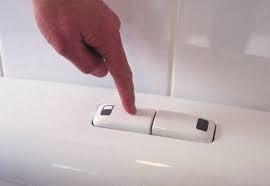
It is important to practice good hygiene and regularly clean all surfaces in the bathroom to minimize the spread of germs.
The flush button, like any other surface, can potentially spread viruses if it is contaminated with the virus and then comes into contact with someone’s mouth, nose or eyes.
The corona virus experience showed us germs can survive on surfaces for varying periods of time, depending on the type of surface, the humidity and the temperature. Therefore, it is important to frequently clean and disinfect high-touch surfaces, such as the toilet flush buttons, to help prevent the spread of germs.
Practicing good hand hygiene, by washing your hands thoroughly and frequently, can also help prevent the spread of viruses.
Save water with a half flush toilet?
In April 2023 most toilets are designed to use less water, so they have a dual flush toilet cistern, which allows the user to choose between a full flush and a half flush.
Using the appropriate flush will help save water.
As we move into Winter, traditionally our dry season, rainfall is less and, water saving is still a thing.
With that in mind, we should use the half flush for liquid waste and the full flush for solid waste.

The full flush is typically used more often than the half flush, as it is designed to clear all waste from the toilet bowl.
Remember not to use the toilet as a rubbish bin. Flushing non-biodegradable items can cause blocked pipes and drains, and cause damage to the plumbing.
If your toilet flush isn’t working as it should it is wasting water and adding to your water bill.
A running toilet cistern sounds like a job for The Lone Drainer and Pronto.
Call us on 02 9664 4990
Click here to see the current water levels in the Greater Sydney Catchment area.
Full Moon Blocked Drains
Regardless of the season, tree roots block drains.
And there is a school of thought they occur more during the full moon :-).
However, there is no scientific evidence to suggest that tree roots are more likely to cause blocked drains during the full moon.
The idea that the full moon affects tree roots and causes them to grow more or become more active is a myth that has been around for a long time.
Blocked drains can be caused by a variety of factors, including tree roots about 85% of the time.
Tree roots grow in response to a variety of factors, such as moisture, nutrients, and changes in temperature, but the phase of the moon has no effect on this process.
Tree leaves and other debris, especially from our deciduous trees can accumulate in pipes, as well as grease, oil, and other substances like paint and even cement sometimes gets poured down the drain.
Regular maintenance and cleaning can help prevent blocked drains and keep your pipes flowing smoothly.
The full moon on the east coast of Australia is at about 14.30 today April 6th, 2023.
World Water Day 2023. Four Ways to maintain our Water Supply
March 22nd 2023 is World Water Day.

G’day, it’s Dave Conroy, the Lone Drainer here to tell you all about World Water Day. This special day is celebrated every year on March 22nd, and it’s all about raising awareness for the importance of freshwater and advocating for sustainable management of this precious resource.
You see, water is essential for all life on Earth, and yet many people around the world still don’t have access to clean and safe water. Plus, with climate change and other environmental pressures, the future of freshwater is becoming increasingly uncertain.
That’s why World Water Day is so important. It’s a chance for people all over the world to come together and take action to protect our water resources. From conserving water in our daily lives to supporting policies that promote sustainable water management, there are many things we can do to make a difference.
To do our part to protect this vital resource, and remember that every drop counts, here are four things that can help maintain our water supply:
- Conserving water: One of the most effective ways to maintain our water supply is to use water more efficiently and avoid wasting it. This can be done by fixing leaks, taking shorter showers, using water-efficient appliances, and reducing outdoor water use (such as watering lawns and gardens only when necessary).
- Protecting water sources: Another important step is to protect the sources of our freshwater, such as lakes, rivers, and aquifers. This can be done by preventing pollution, reducing runoff from agricultural and urban areas, and minimizing the impact of industrial activities.
- Investing in infrastructure: To ensure that we have a reliable supply of clean water, it’s essential to invest in infrastructure that can capture, store, and treat water effectively. This can include building new dams, improving water treatment plants, and upgrading pipes and other water delivery systems.
- Supporting sustainable policies: Finally, it’s important to support Federal, State or Local government policies that promote sustainable water management, such as regulations that limit water use in times of drought or encourage the use of water-efficient technologies. By working together to protect and manage our water resources, we can help ensure that future generations have access to the water they need.
Eight reasons to drink more water.
Here in Coogee, Sydney Australia we are lucky to have a good quality water supply from our taps. As I write this it’s 12.30 pm on Monday March 6th 2023 and its 35 Deg. celsius outside expecting 37 Deg. Its damned hot and humid. We all know that we should Drink more water, and today is a perfect reason to do it.
Now here are eight more reasons to do it

- Hydration: Drinking enough water on any day, let alone today, is essential for staying hydrated, which helps maintain the balance of bodily fluids, regulate body temperature, and support every bodily functions.
- Improved physical performance: Staying hydrated can help improve physical performance by reducing fatigue and increasing our flagging energy levels.
- Weight management: Drinking water can help with weight management by promoting the feeling of fullness. It will help reducing calorie intake, and boosting my metabolism.
- Healthy skin: Drinking water helps keep my skin hydrated, which can improve the skins’ overall health and appearance.
- Kidney function: Drinking enough water is important for supporting healthy kidney function by helping to flush out waste and toxins from the body.
- Digestion: Drinking water can help support healthy digestion by softening the bowels and preventing constipation.
- Reduced risk of certain diseases: Staying hydrated by drinking enough water has been associated with a reduced risk of several diseases, including kidney stones, bladder cancer, and coronary heart disease.
- Improved cognitive function: Drinking enough water is important for optimal brain function, as dehydration can impair cognitive performance and cause headaches and fatigue.
If you have a water filter in your home or workplace, keep using it one glass at a time. If you would like to have a water filter fitted, and need guidance
Call us on 02 9664 4990
World Plumbing Day 2023! Seven tips from your plumber
Saturday, March 11th 2023 is World Plumbing Day.
Plumbing is something we all take for granted. World Plumbing Day is the day to thank your plumber as you brush your teeth, flush your toilet and have a hot shower.
We don’t pay any attention to our plumbing unless, its not working. So spare a thought for your plumber who is on standby to help you. Why not put his name and telephone number into your mobile phone, Just in case!
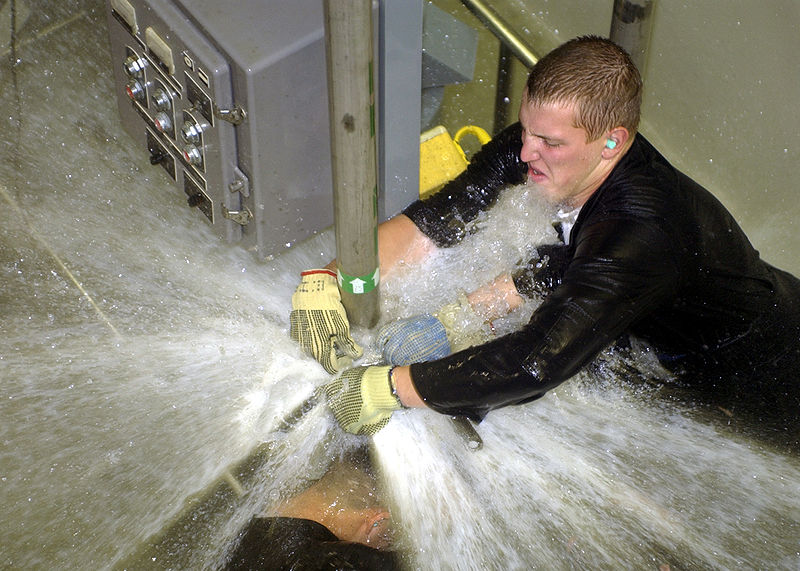
Here are 7 easy plumbing tips to help around your home
- Know where your main water shut-off valve is: In case of a plumbing emergency (like a burst pipe), it’s important to know where your main shut-off valve is so you can turn off the water supply to your home. Bonus tip: Check that it works!
- Know where your water heater is. Check it periodically to see it’s not leaking. Learn how to turn it off and back on again. Bonus tip: Know if it’s heated by gas or electricity.
- Don’t pour grease or cooking oil down your drains: Grease and oil can build up in your pipes and cause blocked drains, it’s important to dispose of them properly. Use a drain strainer in the sink to catch scraps of food.
- Keep a sink plunger in your home. Know how to use it!
- Check for leaks: Regularly check for leaks under kitchen sinks and vanity basins. If you see signs of water, have your plumber repair them as soon as possible to prevent water damage. Bonus tip: Flexible water connections have become very common in Australian homes. Some Home insurance companies insist homeowners check them regularly and have your plumber change them periodically. When they burst, they cause a lot of water damage very fast. (See Tip #1)
- Don’t flush anything other than toilet paper: Flushing things like “flushable” wipes, sanitary products, or paper towels will block your drains.
- Leaking toilet cisterns can waste a lot of water. Know how to turn your cistern on and off until its fixed. Bonus tip: If you’re desperate, you can flush your toilet with a bucket of water.
Make sure you get a professional for complex plumbing problems. While some plumbing repairs can be undertaken by a competent home owner, more complex tasks like installing a new water heater or fixing a concealed leak should be left to a professional plumber to ensure they’re done properly.
Are you buying a house on a tree lined street? Six things to consider!
If you have your eye on a house in a tree lined street, you should read this!
While street trees can have many benefits, there are also some potential negative impacts that should be considered.
- Damage to the street infrastructure: Street trees can cause damage to footpaths, roads, and buildings if their roots grow too close to or under them. They can also damage underground utilities such as electrical cables, water and gas pipes. The tree root systems will also cause blocked drains and sewer pipes. If you get a blocked drain you should call The Lone Drainer and Pronto.
- Maintenance: Street trees require regular maintenance, such as pruning and watering, to ensure they remain healthy and safe. This can be a significant cost for utility companies, municipalities and homeowners. Radical pruning is used to shape the street trees away from overhead electric power and communication lines.
- Allergies: Some people may have an allergic reaction to certain species of street trees, such as those that produce a lot of pollen.
- Invasive species: Some species of street trees can become invasive, meaning they can spread rapidly and compete with the native species. This can have a negative impact on local ecosystems and biodiversity.
- Canopy closure: Street trees can cause a canopy closure, blocking the sunlight and view, making the street darker and less attractive in the winter months. However, in our hot summer, the shade they provide brings a welcome relief from the heat of the day.
- Your car: Parking your car under a tree like this Hill’s Weeping Fig Ficus microcarpa hillii during certain seasons can be very messy. The fig has berries….. Lots of them. They attract possums, flying foxes and birds that feast on the berries and subsequently make a BIG mess on your car.
It’s important to consider these potential negative impacts when selecting, planting, and maintaining street trees. Proper tree selection, planning, and management can help to minimize these negative impacts and maximize the benefits of street trees.
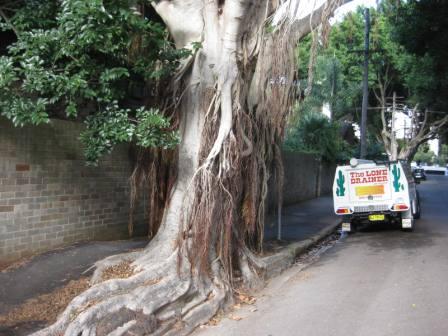
Do Hot and Cold Pipes get Water Hammer?
Water hammer can occur in both hot and cold water pipes. It’s caused by a sudden change in the velocity of water flow, like when a valve or faucet is quickly closed. This sudden change in velocity can cause a pressure wave to travel through the pipe, creating the banging or knocking sound that is characteristic of water hammer.
The main cause of water hammer is water pressure that is too high, which causes the water to move too quickly through the pipes. This can happen in both hot and cold water pipes, and can be caused by a variety of factors such as worn out valves, loose pipe connections, or improper pipe installation.
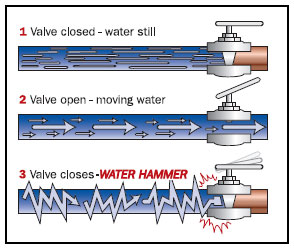
In some cases, the problem is more likely to occur in hot water pipes because hot water is less dense than cold water, and therefore is more susceptible to changes in velocity. However, it is possible for water hammer to occur in both hot and cold water pipes, so it’s important to address the issue as soon as it is detected.
Read our earlier post What is Water Hammer and How to Stop It here
Super Bowl 2023 Flush with Excitement.
The Kansas City Chiefs defeated the Philadelphia Eagles 38-35 in Super Bowl 57 at State Farm Stadium in Glendale Arizona on Monday morning Sydney time. It was the team’s second title in four seasons. Now Aussies Jordan Mailata an AFL player and punter Arryn Siposs a Rugy league man, made Australian sporting history when they played for Philadelphia. 🙁
Personally, apart from my son going to a game at the stadium when he was studying at NAU Northern Arizona University in 2019, I know little about the contest other than to say the Chiefs star Quarterback Patrick Mahomes apparently won the game after his team was behind 24-14 at half time.

And its the half time break that gets my interest! Specifically, toilet flushing at half time.
In a post from Super Bowl 2016, I wrote that the amount of water used in toilet flushing during the Super Bowl half time break is the same volume that would flow over Niagara Falls in seven minutes.
In doing some research on the topic, anecdotally, it is often joked that there is a Super Bowl flush that occurs during the halftime break, as many viewers may use the bathroom at the same time. However, there is no reliable data to support the claim.
In fact, some experts have suggested that the idea of a simultaneous flush causing water system issues is a myth, as modern water systems are designed to handle large surges in demand. While it is possible that water demand may increase during the halftime break or the Super Bowl flush, the impact on water infrastructure is likely to be minimal.
Our local Sydney news reporting on the Super Bowl reckon there are now more Australians watching that game than the Melbourne Cup.
Given Super Bowl lasts three and a half hours and, The Melbourne Cup lasts three and a half minutes, the halftime Super Bowl flush might be a thing.
What do you reckon?
Five ways street trees affect your home!
If you’re considering buying a home in a tree lined street like this, you need to know how trees can affect houses on the street. Here’s just a few,
-
Property value: Street trees can have a positive impact on property values. Studies have shown that houses with street trees have a higher market value than houses without street trees.
-
Energy efficiency: Street trees can help to reduce energy costs by providing shade and reducing the amount of heat absorbed by houses. This can help to keep houses cooler in the summer and reduce the need for air conditioning.
-
Aesthetics: Street trees can enhance the appearance of a street and contribute to a more pleasant and inviting neighborhood.
-
Environmental benefits: Street trees can help to improve air and water quality, reduce storm water runoff, and provide habitat for wildlife.
- Some species can grow too large and cause damage to the roads, footpaths and sewers and storm water drains of houses or businesses on the street.
It’s important to note that while street trees have many benefits, they also require maintenance and care to ensure they are healthy and safe.
In Sydney Australia, local Councils as the owners, are responsible for maintaining the street trees on their property, including pruning, watering and removing dead branches or fallen leaves, and the maintenance of the blocked drains they cause.
It’s important they select the right species of tree for the location and space available, as some species can grow too large and cause damage to the roads, footpaths and sewers and storm water drains of houses or businesses on the street.
Read our previous posts about street trees and how blocked drains are managed by Randwick Council, Waverley Council and Woollahra Council here.
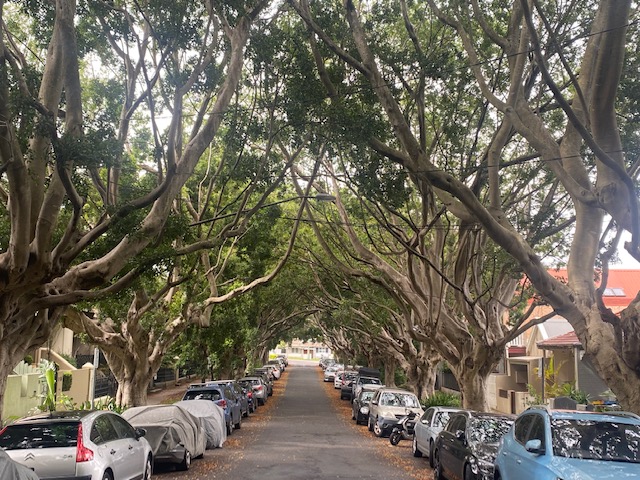
What is Water Hammer and How to Stop It!
Water hammer, also known as hydraulic shock, is a banging or knocking sound that can occur in pipes when a valve, a tap or faucet is quickly closed. The banging noise and vibrations from water hammer can be felt throughout a house and, in multi-storey buildings, because the water pipes pass through and serve every level, banging can be heard on building levels far from the source of the water hammer. It can be caused by a variety of factors, including high water pressure, improper pipe installation, or worn out valves. Some causes include, the fitting of a new dishwasher or clothes washing machine, or fast closing mixer style taps that shut down or stop the water flow quickly.

Stopping water hammer can be challenging, as it often requires identifying the root cause of the issue and then implementing a solution. Some common solutions include installing water hammer arrestors, which are devices that absorb the shock of rapidly moving water, replacing worn out valves, or adjusting the water pressure.
In some cases, the solution may be as simple as tightening loose pipe connections or securing loose pipes.
However, it is always recommended to consult a plumber if you experience water hammer, as they can diagnose the issue and recommend an appropriate solution.
